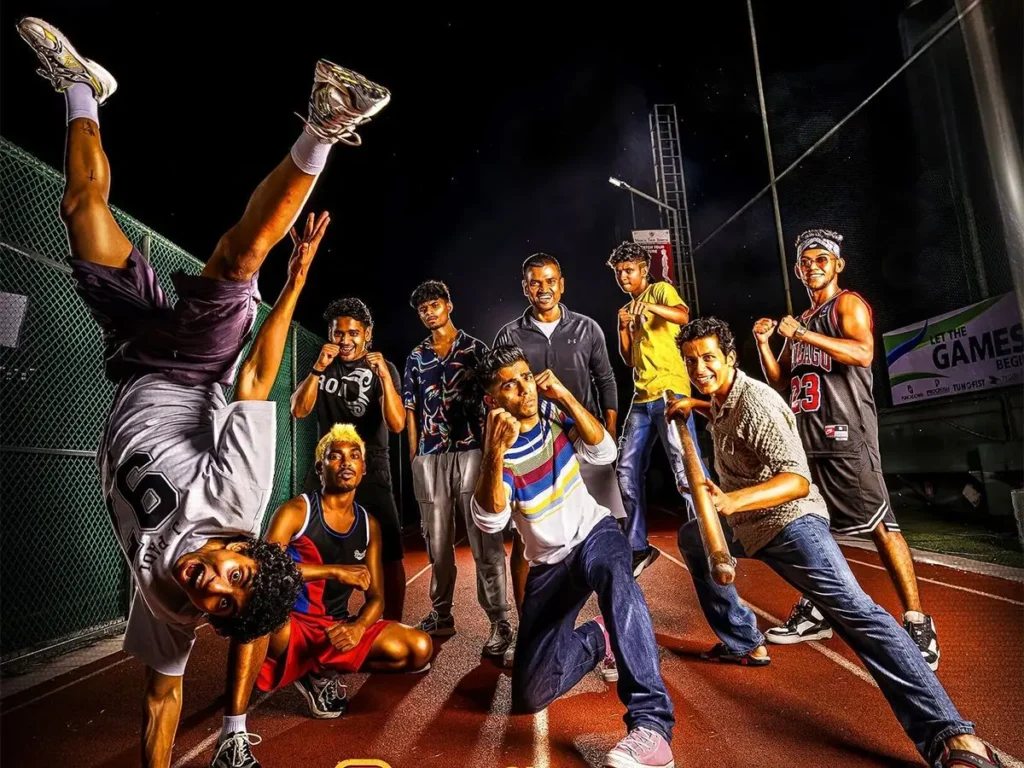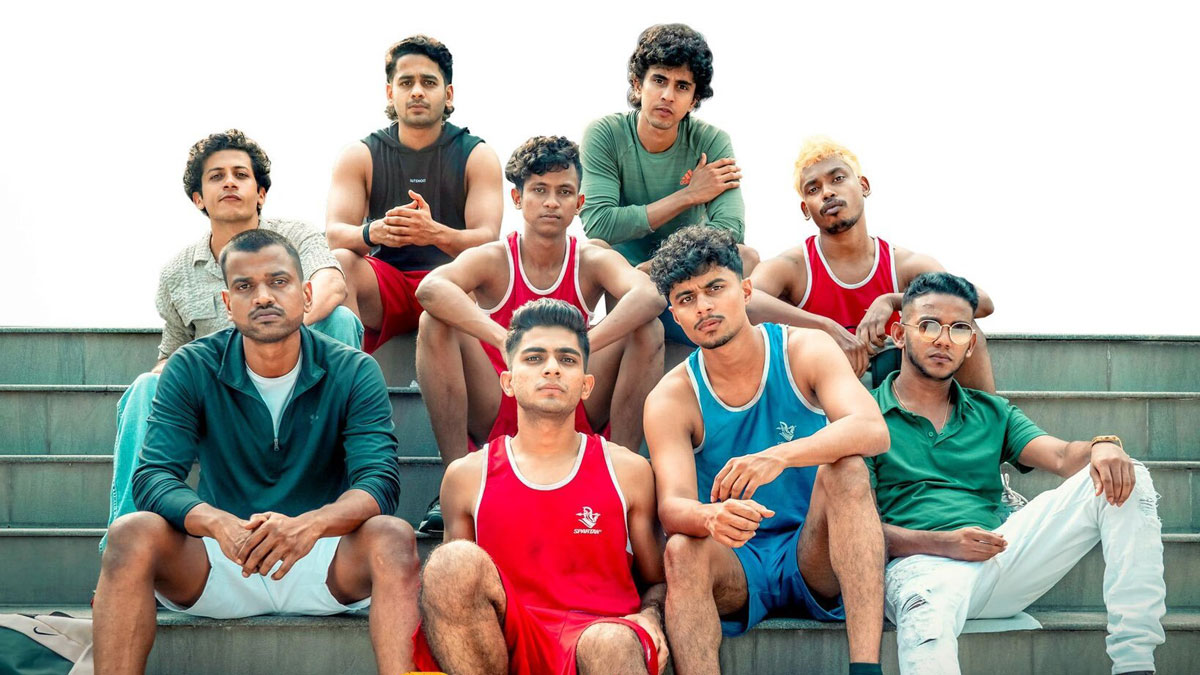
It is a long-standing and mildly derogatory phrase in Kerala to describe someone’s qualifications as “Pathum Gusthiyum” (which translates to “10th standard and wrestling”). While the label may sound condescending in an academically inclined state like Kerala, its beneficiaries often make the most of the perks that come with the sports quota. In Khalid Rahman’s Alappuzha Gymkhana, a group of 12th-fail lads eye college admissions and government jobs through athletic merit as they take up boxing, the trendier cousin of gusti.
In one of the film’s most realistic moments, Jojo (Naslen Gafoor) is left dumbstruck when his crush asks, “Is it kickboxing or normal boxing? What exactly are you into?” It’s a fair question because testosterone isn’t the first thing that comes to mind when you think of the actor. That’s not to downplay Naslen’s sex appeal; he’s undeniably Malayalam cinema’s latest pin-up boy. It’s within this space of unlikeliness that Khalid Rahman crafts a believable world. Jojo isn’t the typical dhoti-clad, Sathyan Anthikkad-style unemployed youth burdened with liabilities and unwed sisters. He and his friends are today’s youngsters who throw house parties, dress in trendy clothes, and flaunt stylish haircuts. In this setup, Jojo, Cheruthu, Veluthu, Deepak, Christopher, David, Shanavas, and Kiran each play a distinct role, bringing their temperaments and skills to the ring.
When it comes to boxing, Alappuzha Gymkhana isn’t a conventional genre piece. I was surprised to find no classic hero’s journey for any of the characters. There’s no monumental climactic fight or a sweeping emotional payoff. Yes, most of them do get an arc, and Jojo experiences a subtle coming-of-age moment. But all of it unfolds within a setting that doesn’t feel crafted for effect, whether it for humour or thrills. Rahman’s film has fewer of those hair-raising moments we enjoyed in Thallumaala. The bronzed torsos featured in the promotional material aren’t used in the film for action or as thirst traps. These guys are boxers, and they simply end up getting fit. That’s all there is to it.
The first two acts of Alappuzha Gymkhana play out like a mini docu-drama on how one steps into a lesser-played sport in Kerala. The noticeable absence of a background score makes the film feel dull in parts. Then again, there’s little heightened drama in these segments to justify thunderous sound effects. In contrast, Vishnu Vijay’s songs are integral to the narrative, and the film becomes noticeably more engaging when they play. As Alappuzha Gymkhana moves into its latter half, it picks up the pace with a series of boxing matches, bursts of humour, and a conventionally staged conflict between the team’s coach Antony Joshua (Lukman Avaran) and a former rival. As the fights wrap up one by one, we witness the bond between the coach and his protégés evolve into something mature. In a scene set inside an ambulance van, Joshua opens up completely, shedding all traces of shame in front of his boys. With a ripped physique and a no-nonsense aura, Lukman ends up being the biggest scene-stealer in Rahman’s film.

Alappuzha Gymkhana doesn’t offer much space for its female characters, but in the limited moments they get, the women leave a mark. Noila Francy, Jojo’s best friend, even offers an amusing take on kissing. Anagha Maya Ravi’s Natasha sees right through Jojo’s naughty advances. As Anupama, Nanda Nishanth has her priorities firmly in place, especially when the awkward Jojo doesn’t. This highlights how Rahman’s film avoids romanticizing violence or glorifying toxic masculinity. Even Joshua’s character is shaped with restraint; he’s simply a decent man who wouldn’t pick a fight for the sake of entertainment or a testosterone high.
That said, Khalid Rahman’s sports comedy is not quite his best. Morally, it attempts to paint a picture of goodness, but we’re talking about filmmaking here. The screenplay (by Khalid Rahman and Sreeni Saseendran) is intentionally low-key, with a built-in lack of energy. This isn’t simply a critique based on the film’s broad genre, which naturally offers the potential for goosebump-inducing moments. Alappuzha Gymkhana doesn’t seem ambitious enough to stir any deep emotion. A key indicator of this is the absence of a clear antagonist. Aside from a couple of confrontations and a final brawl, the film doesn’t frame the protagonists’ struggles against a solid adversary. Even an unrelenting system could have filled that void. But it simply isn’t there. Rahman keeps the tone light throughout, which means the film never quite lands when it tries to become an underdog victory saga.
ALSO READ: ‘Premalu’ review – The Malayalam rom-com merits to become a nationwide rage
As Jojo, Naslen is a joy to watch. His physical transformation is commendable, and his magnetic screen presence is used to full effect as he becomes a sort of sutradhar for the story. He also earns brownie points for not chasing heroic moments, choosing instead to step back and let his co-actors shine when it’s their turn. One of the strengths of this ensemble is how distinct each character feels, whether in temperament or reflex. Strangely, the film doesn’t seem as curious about exploring their quirks. Karthik as Christopher is a delight with his wry humour, while Shon Joy’s Kiran is an instant charmer. Franco Francis brings loads of attitude to Cheruth, and Ganapathy, Sandeep Pradeep, Shiva Hariharan, and Baby Jean all get their share of standout moments, too.
DOP Jimshi Khalid frames both the rustic rhythm of Kuttanadan life and the sweaty intensity of boxing rings with originality. The late Nishadh Yusuf injects a sharpness into the editing that recalls the energy of Thallumaala, giving Alappuzha Gymkhana a modern texture even as it tells stories from the margins. The film’s technical strengths are evident throughout, with impressive work across production design, costume, and action departments. Yet, what elevates the film is Khalid Rahman’s instinct to colour outside the genre lines. He constructs a narrative that lives at the periphery of the conventional sports drama, drawing us into a world that feels lived-in rather than staged. The last time I felt this surprised by such natural, immersive chaos was when Abrid Shine transported us to the youth festivals in Poomaram. In many ways, Alappuzha Gymkhana plays like an airy, behind-the-scenes glimpse into the world surrounding a major sporting event. The euphoria might be subtle, but the heart is exactly where it should be.
Rating: ★★★ 1/2

